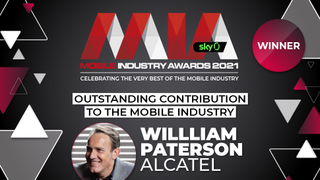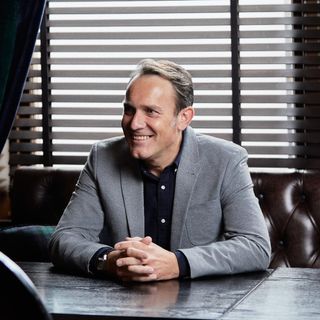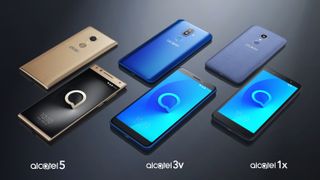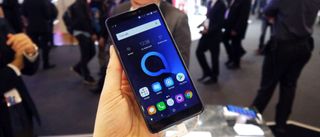Mobile Industry Awards 2021: Alcatel's William Paterson wins Outstanding Contribution
Alcatel's Country Manager for UK & Ireland has spent more than 30 years in the industry

This year’s winner of the Outstanding Contribution to the Mobile Industry award has been in the industry since almost the very start. The first mobile phone call was made in the UK in 1985, and three years later William Paterson started his first role in the business.
Paterson, who had previously worked as a barman and in Topman selling suits, started work as a canvasser on June 26, 1988. Canvassing meant travelling around businesses in industrial estates in Scotland, speaking to receptionists to see if the company in question had, or had thought about getting mobile phones.
“I absolutely loved it,” he tells TechRadar Pro. “You learned things that you don’t learn at school at university. I learned to communicate with people and understand that everyone is different. Most people in 1988 had never ever seen a mobile phone never mind used one!”
A life in mobile
Paterson moved onto become a sales representative, a role which meant he didn’t just collect information but needed to learn about the products. Back then, there were three types of mobile phone – a carphone which was affixed to a vehicle, a transportable, and a handportable.
These devices were incredibly expensive and hardly compact – characteristics that evoke cliched images of stockbrokers talking into brick-sized handsets or yuppies like Del Boy from Only Fools & Horses keen to boast about their new gadget.
“The first product I ever sold was a Motorola 8000S for £2,500,” says Paterson, confirming the eyewatering sums that were required to acquire the technology at the time. But even then, he could see how revolutionary this technology was going to become.
Over the course of a decade, he worked as a canvasser, a closer, a sales manager and, eventually, a sales director once the company he was working for was bought by Scottish Power who wanted a telecoms division.
Are you a pro? Subscribe to our newsletter
Sign up to the TechRadar Pro newsletter to get all the top news, opinion, features and guidance your business needs to succeed!
Eventually, a role with Alcatel as Country Manager for the UK & Ireland came up in 1998 and he was keen to try something different. Rather than selling services and handsets to businesses, Patterson would instead be dealing with operators and retailers in a bid to expand the reach of Alcatel’s products.

Dynamic industry
He has stayed in the industry, and with Alcatel, ever since.
“I love that the industry is always evolving,” he says of his longevity, adding that a friend of his works in the sale of screws and bolts – a trade that is of great importance but not as dynamic. “I love that the industry is always evolving. When I started it was analogue, then GSM, 3G 4G, and now, 5G. I feel really lucky to be an industry like that.”
When asked what his favourite innovation of his three decades in the sector is, he has a surprising response: “For me, it has to be the advent of text messaging. I remember getting my first SMS before it launched [commercially] and it was amazing – a message you could read! I think that’s the biggest leap forward that we’ve been able to communicate as an industry. Sure, picture messaging and other things have been great but it’s not the same jump.
“I’ve seen the progression of mobile from a business tool to something everyone has. I think that’s brilliant because technology should be available to everyone. It’s really important that this tech is widely available. We can make this fantastic technology available to everyone no matter how much money they’ve got, and this has never been more important than it has been in the past 18 months.”

Alcatel journey
This ethos of great technology at an affordable price is one that Paterson shares with, or has been influenced by, Alcatel.
“We’ve always been about great technology at a great price and all of our partnerships are focused on that belief,” he explains. “You don’t need to spend a lot to get a phone that can use WhatsApp.”
It’s this commitment that has seen Alcatel survive for so long. When mobile phones became mainstream propositions, the market was populated by the likes of Sony, Ericsson, Siemens, Motorola, Nokia and Panasonic – brands that have either scaled back their interest or retreated entirely. However, Alcatel is still around.
“A lot of people don’t know that Alcatel has been in the market consistently [over the past few decades]. People know Alcatel is a great product at a great price point. That’s never changed,” he explains. “It’s pretty remarkable given we are in such a competitive environment, and you think about all the brands that have dropped out [over the past few decades].”
The next few years will see Alcatel compete with the likes of HMD Global, which makes Nokia devices under licence, and Chinese manufacturers, such as Oppo and Xiaomi, looking to expand into new markets with affordable but feature-packed handsets.
However, Paterson relishes the challenge: “Competition is good for the consumer and makes you work harder. I’ve always welcomed it.
“I still get a real kick out of walking into a store and seeing one of my products on the wall because some of the work I’ve done has led it to be there. On Saturday, I ran past someone using an Alcatel phone and I thought ‘someone is using a bit of my tech!’. That’s really exciting for me. You’d think it would wear off after all these years.”

Leadership style
In 2020, Paterson helped launch the TCL brand in the UK, adding another string to his bow, and there has been a renewed focus on the B2B market as the role of connectivity and mobile technology becomes increasingly important to society.
“Can you imagine if the pandemic had hit even just 15 years earlier?” he asks. ““My whole team and I have worked from home for the past 18 months, but can you imagine trying to run a business without connectivity, video calls? We’re lucky we have the tech we have and people have access to it.”
Paterson describes his leadership style and the culture he hopes to install among his team as “open and inquisitive” so that everyone understands and strives to achieve the same goal.
“For me, it’s like having a good party with the right guests and the right atmosphere. I’ve been really lucky with the teams I’ve had over the years, and I’ve tried to evolve them.”
“I lead a team of 20 in the UK & Ireland – that’s not massive so it’s important that everyone knows their role. If one bit of the chain doesn’t work, then the team doesn’t work.
Looking forward
Paterson’s values extend beyond commercial targets. Under his leadership, Alcatel has contributed to several charitable causes that help young people through sport and provide financial support to families who can’t afford Christmas presents.
During the pandemic, the company helped the NHS as possible to keep them connected and also assists with Motherwell FC, a community-owned football club in Scotland, with its outreach projects.
“When you’re in a market, selling a product and generating revenue then you’ve got to give something back – it’s the right thing to do,” he says. “We support a number of charities, a lot of which are about helping young people.”
Paterson says he is absolutely delighted with his Outstanding Contribution to the Mobile Industry award, but adds he has no intention of stopping just yet.
“It’s a real privilege to be given this,” he says. “I’ve been really lucky in that I’ve worked with some great people over the years. This isn’t really about me, it’s about everyone that’s worked with me from an agency level to the tech team and to our customers – having good relationships with them is key.”
“I want to keep doing what I’m doing, building our team and having the right team so that whenever I do decide to leave there’s a proper succession plan.”
So having witnessed virtually every single major development in the history of our industry, Paterson is pretty well-placed to predict what comes next.
“I think we’ll move away from black rectangle [form factors] to new types of screen,” he suggests. “I don’t know how quickly that [process] will move because of the price attached to that, though.
“I can also see more wearable tech. To date, it’s been pretty niche but it’s going to be a much bigger thing in the future. Of course, so will 5G and M2M.
“Like I said, the mobile industry is always exciting and always evolving.”
- You can find out all our Mobile Industry Awards 2021 winners here
